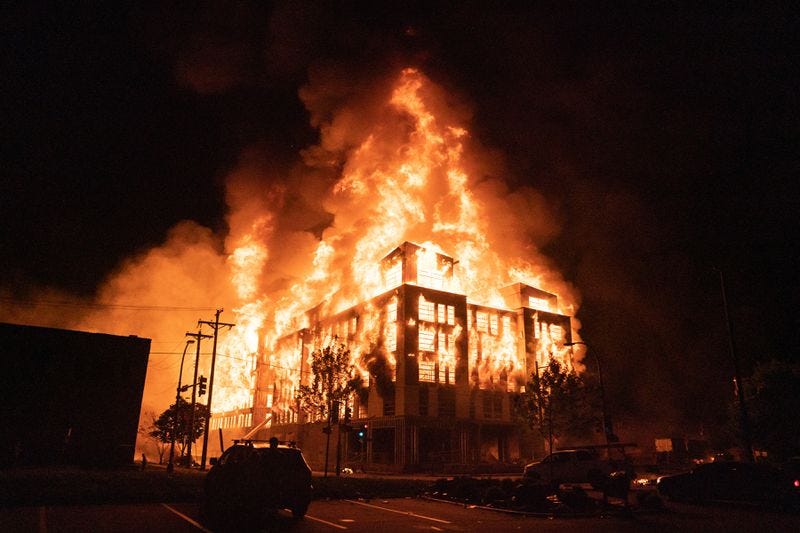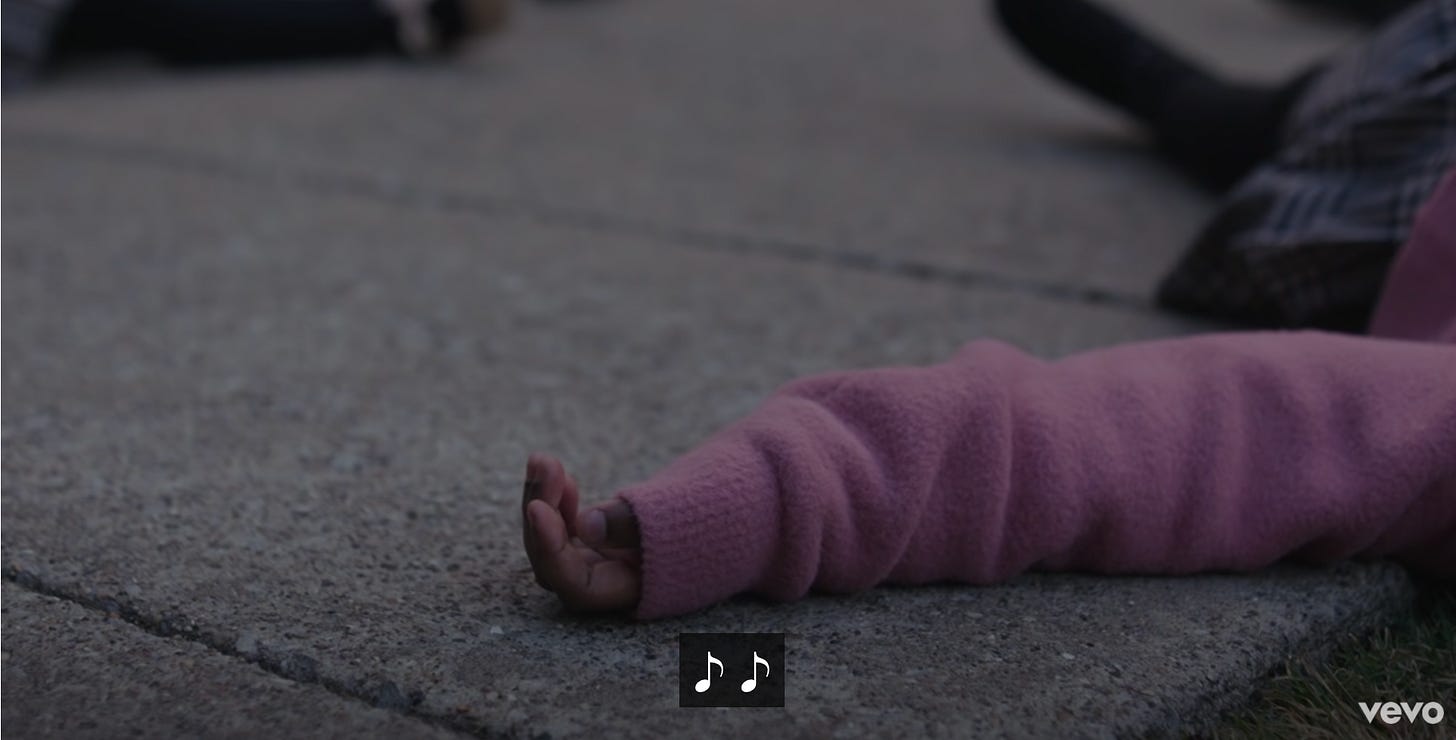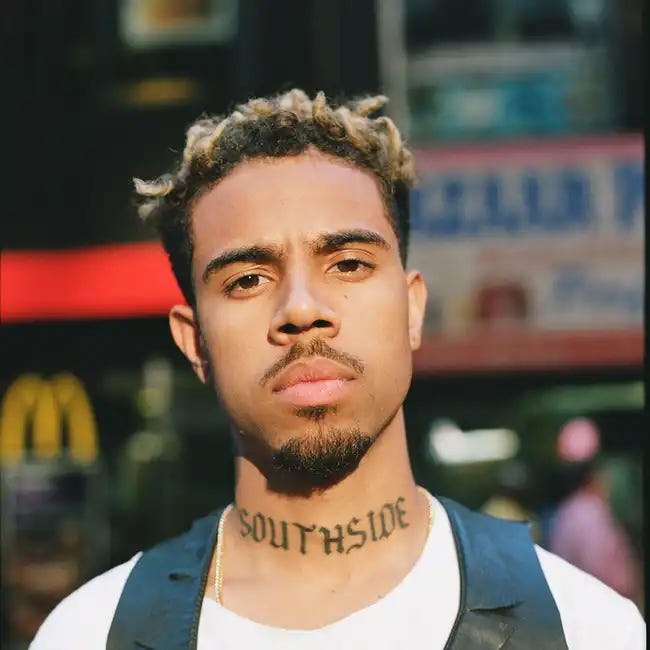Reparations Daily (ish) Vol. 70
Hip-Hop and Reparations: Breaking Down 'Shelter' by Vic Mensa, Chance the Rapper, and Wyclef Jean
Happy Friday!
Last week, one of my favorite artists, Chance the Rapper, dropped a snippet on Instagram for a new song featuring his good friend Vic Mensa titled ‘Fillings/George Washington.’ In just 43 seconds, Chance hits us with some uncanny wordplay that seeks to reframe the narrative of this nation’s first President. “I heard George Washington died at the dentist getting fillings/ he had slave teeth by the hundreds but bacteria by the millions.”
I tweeted it immediately and tagged him, and to my surprise, he retweeted it within seconds.

The Chicago music scene is considerably underrated. It’s given us pioneering artists such as Common, Noname, Earth, Wind, and Fire, John Legend, Sam Cooke, Juice WRLD, Vic Mensa, and the artist formerly known as Kanye West. These artists, and plenty of others, have consistently challenged dominant cultural, political, and economic worldviews and sought to shift the stories that guide how people make meaning of race and racial experiences.
So, today’s Hot Takes pays homage to some of these artists and explores how Chicago music has touched on the topics of race, repair, and reparations, with a focus on a recent single by Vic Mensa, Chance the Rapper, and Wyclef Jean, titled ‘SHELTER.’
You can watch the music video for the song below and read the Genuis breakdown of the lyrics here.
Head to the Hot Takes section for my analysis!
Some reparations-related news you might want to check out today:
This Rolling Stone article about a lawyer on a quest to deliver reparations in the music industry is timely and related to today’s Hot Takes section (OG article is behind a paywall, you can read the full article here.)
Yesterday, Major League Soccer took out a $25 million loan from eight different Black-owned banks with the goal of reducing the racial wealth gap, according to CNBC.
The Center for American Progress released a fact sheet summarizing the Biden administration’s efforts to advance racial equity through the federal government.
If you haven’t heard of the activist group behind the ‘Slavers of New York’ campaign, you need to read this article from Untapped New York. They’ll be featured here soon (fingers crossed for March).
The anti-history movement has scored another victory, as the Florida GOP passed a bill that will limit how K-12 teachers can talk about race, according to ABC News.
With radical love,
Trevor
National News
Rolling Stone: ‘Compensation, Healing, and Closure’: One Man’s Quest for Reparations in the Music Business.’
Center for American Progress: Fact Sheet: Advancing Equity
New York Times: In Democratic Bastion, Liberal Rhetoric Is Out. ‘Affordability’ Is In.
Econlib: Let’s Pay For Reparations By Taxing Elite Colleges
New York Times: A Lion of the Civil Rights Era Is Still Preaching Optimism
NPR: Racial justice activists say Biden's State of the Union address missed the mark
Los Angeles Times: It’s chemical and psychological warfare: A heavily polluted waterway torments L.A. communities.
USA Today: We're helping Ukraine. When will America address its own refugee crises?
The Hill: Kerry: Wealthy nations to live up to $100B climate change pledge next year
Yahoo! News: ‘It’s Not Trauma Porn’: Keke Palmer Says New Slavery Film ‘Alice’ Is Meant to Be Uplifting, Not Traumatizing
Axios: The rise of white nationalist Hispanics
Regional News
Los Angeles Times: They say California stole their ancestors’ land. But do they qualify for reparations?
ABC News: Florida GOP lawmakers pass bill to limit discussion of race
Untapped New York: HOW SLAVERS OF NEW YORK USES STICKERS TO UNVEIL NYC’S HIDDEN HISTORY OF SLAVERY
Daily Hampshire Gazette: Amherst will petition state for reparations initiative
Forward: In West Virginia, a ‘critical race theory’ bill leads to a statehouse debate over Jews and race
AL.com: Anonymous donor to pay Montgomery’s $25K fine for violating Confederate monument law
DCist: Fairfax County Group Recommends Changing Names Of Lee And Sully Districts
WTLX: South Georgia city aims to remove Confederate statue
HuffPost: Miami Herald Rips GOP’s ‘Terrifying Tolerance Of White Supremacy’
Yale: For new Yale center, the fight for racial justice begins locally
International News
Star Tribune: Japan PM, South Korea president-elect agree to improve ties
Hot Takes
“There’s a war going on outside/ That nobody’s safe from,” Wyclef Jean eerily hums to open up the song, ‘SHELTER,’ which was released as a single ahead of lead artist Vic Mensa’s album I TAPE. The song, also featuring Chance the Rapper, is set behind the backdrop of Covid-19, as Western countries were just starting to jab people with a variety of vaccines.
What war Wyclef is singing about could be left up to the listener's interpretation, but we know that these three are speaking directly to the Black community. “Shelter is a spiritual note, a healing frequency,” Mensa described in a press release. “It was inspired not by Hollywood or Paris, but by what’s going on on the ground — in the real world, with real people.”
The song's video opens with four Black girls playing Ring around the Rosie in front of a burning building. The famous nursery rhyme that many of us sang in elementary school is said to refer to the plague. “Ring around the Rosies” refers to the red rashes that plague victims developed. “Ashes, ashes” is said to refer to the burning of the dead bodies after succumbing to the illness (reminiscent of the early days of Covid-19 in New York City). “We all fall down” refers to the millions of people who died from the plague.
The burning building can be interpreted as the United States of America — on fire as its citizens rise and push back against an oppressive carceral system. It reminded me of the police station set on fire in the days immediately following the brutal murder of George Floyd.
The plague the artists are referring to is a nod to both the Covid-19 pandemic and anti-Black racism. When the four girls fall, they don’t get back up — alluding to the ways in which anti-Black racism literally takes Black lives.
As Mensa walks down an empty street, Jean touches on a crucial point; that anti-Black racism harms all of us, including white people. According to Jean nobody’s safe from this war, but if we can collectively embrace and take care of each other, we might just make it.
In the United States, wherever there is Black life, death is not too far behind it, which is evident as Mensa starts to venture further down the street and lifeless Black bodies start to appear. In a self-assured tone, Mensa opens up his verse by asking a pointed question, “Wyclef told me to call 911, but who do you call when the ambulances don’t come?”
Simultaneously paying homage to the Wyclef Jean and Mary J. Blige smash hit from 2000, ‘911,’ while also nodding to the fact that poor communities of color, particularly Black communities, experience longer ambulance wait times. Mensa lets you know from the start that he will not be mincing his words on this track.
Vic’s opening verse confronts and corners you, pushing you not to look away from the scenes of the Black neighborhoods in his hometown of Chicago. “Hospital workers in scrubs with no PPE, by they got money for riot gear, my nigga, we dying here.” Each bar reverberates off your ear as he weaves together a story of so many neighborhoods in big cities; disinvestment, over-policing, and lack of employment.
As Genius notes, there are only six trauma centers in Chicago, with none of them being on the South Side of Chicago, where Mensa is from and has ensured we will never forget with his trademark neck tattoo. If he wants you to remember one thing, it’s that he is an anomaly; most of the people who grew up in his neighborhood will never achieve the ‘American Dream’ that we are all promised.
Enter Chance the Rapper.
Vic passes the baton to Chance, who picks up where he left off by immediately talking about the violence and poverty in Chicago. “It’s a hundred bags under the underpass, rumbling stomachs, cups jingle when Hummers pass,” Chance raps.
As one of my favorite rappers, I’m admittedly a little biased, but I believe Chance has an incredible knack for delivering messages and uplifting narratives in such a creative way that those on the receiving end might not even realize what he’s aiming to do. He’s the music industry’s historian — constantly reminding us of this nation’s history and its reluctance to address both past and ongoing racial harm.
“They manifested destiny a bunch of land they could steal/ thinking about Kenneth Walker and Philando Castile,” Chance booms with his iconic “3” hat resting on his head as another burning building sits beside him. In just one bar, Chance sums up the origin story of this country — that it is built on stolen land and on the backs of Black bodies.
Chance ends his verse with a nod to what is owed to the multitude of communities that have been denigrated, saying, “It’s a mystery, we never heard the murder she wrote/ If we finally paid her back, the whole Earth would be broke.” A question that I commonly ask myself in this work is whether there is enough money and resources to repair all of the harm that has been caused — according to Chance, there isn’t.
The song's third verse, and Vic’s second, close out the song and draw out the narrative of repair that Chance started. Vic devotes this verse to his boys “doing life with no possibility of parole” and the likes of Elijah McClain, as he struggles to understand how a country could lynch its own citizens and then turn around and send them out to fight a war in a foreign country.
The most important bar of the entire song comes in this verse when Mensa raps, “We demand reparations, and they tell us, ‘have patience’/ Instead of cash payments, we get minimum wages.”
The first time I heard the word “reparations,” mentioned in a rap song, was by another Chicago-great, Saba. In his 2017 song, ‘World In My Hands,” the young star also calls for reparations with a bar at the end of the song where he states, “Screaming reparations til my respiration meet the expiration!”
The two rappers bluntly name what they, and many other Black Americans, have long called for; reparations.
Vic further criticizes other failed economic policies such as minimum wage, which has not kept up with inflation and has dropped in real value by 31 percent since 1968.
Vic also touches on another common narrative within racial justice policy discussions — the idea that Black people need to be more patient for progress. This is what I call the incrementalist narrative, which has served as a roadblock in the search for justice throughout the history of the United States.
The incrementalist narrative is a close cousin to the racial progress narrative — which Dr. Michael Kraus recently outlined perfectly in a LA Times op-ed, describing it as the idea that “most Americans want to live in a society that is more racially equal, and so they engage in mental actions that ignore, discount or downplay contradictory evidence to maintain coherence between belief and reality.” What Kraus calls mental actions, I like to call mental gymnastics. Many Americans, particularly white Americans, engage in mental gymnastics to ignore the realities that Mensa highlights throughout SHELTER.
When people like Mayor Eric Adams are denigrating rap music, I think it’s important to be reminded that rap and hip-hop artists have always sought to tell the stories of their communities. In a statement after the song was released, Wyclef Jean wrote that “it’s very crucial we, as musicians, use our voice to represent those who are not so easily able to be heard.” He’s both right and wrong.
Musicians, particularly the likes of Jean, Mensa, and Chance, have much larger platforms than we do as individuals. But, collectively, the voices of Black people are one of the most potent forces on this planet. Let us not forget that black people in Minneapolis ignited the largest ever global protests against anti-Black racism the world has ever seen.
When music comes like this — personal, introspective, raw, that shifts, dissects, and disrupts dominant narratives, it needs to be called what it really is; building power in line with the community.
My hat goes off to all three artists.
You can watch the acoustic version of the song below — directed by Chance.






